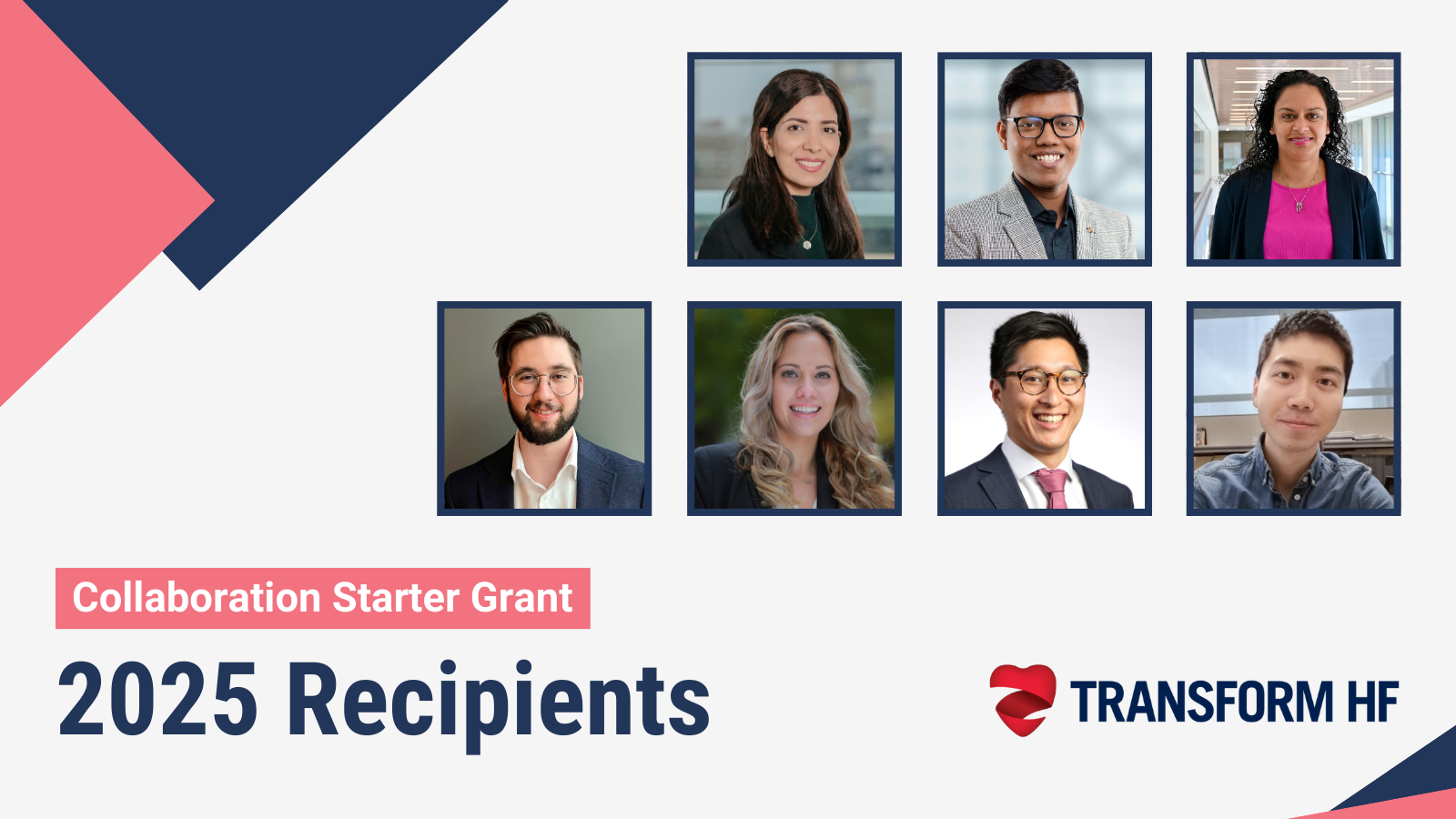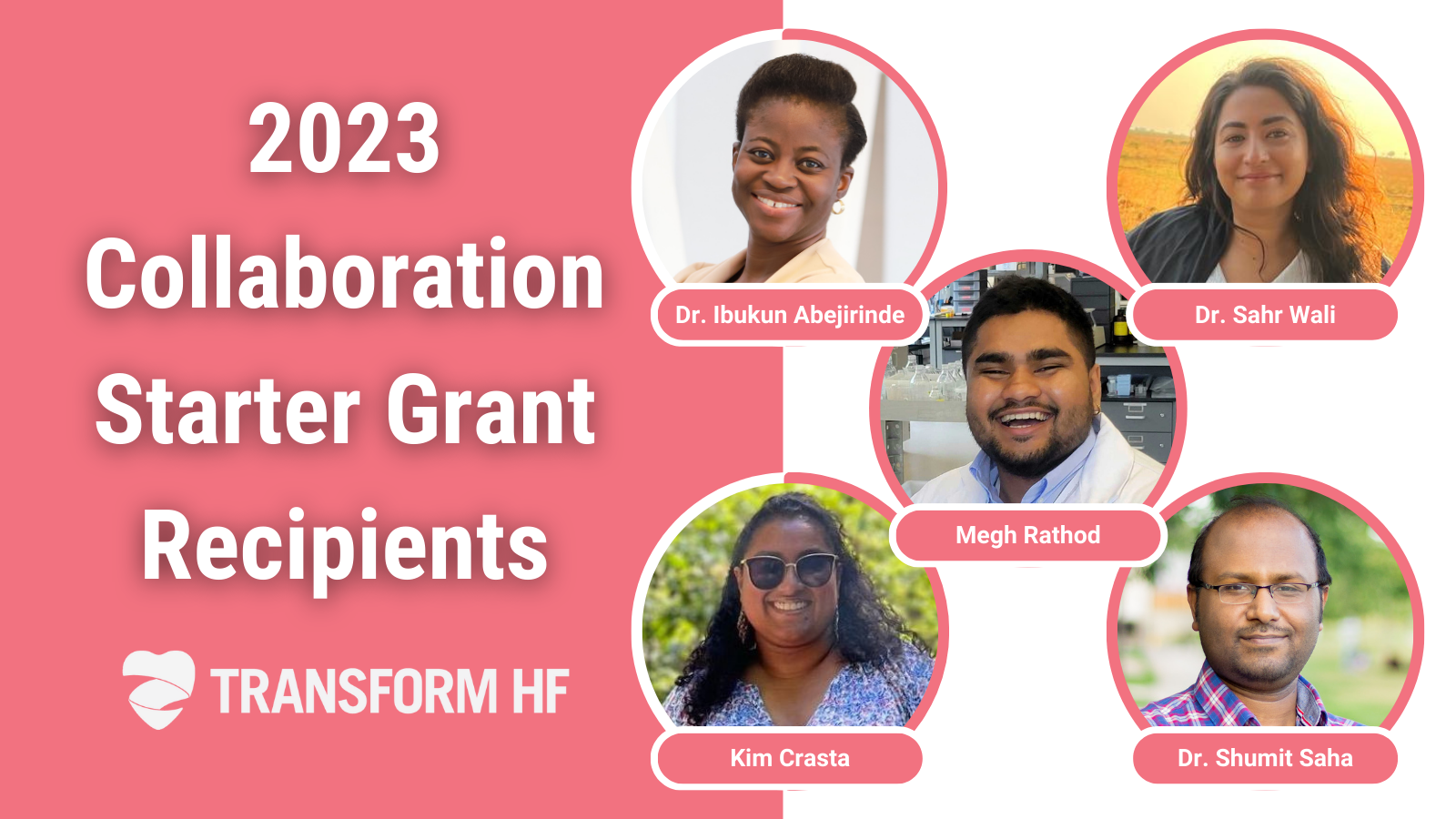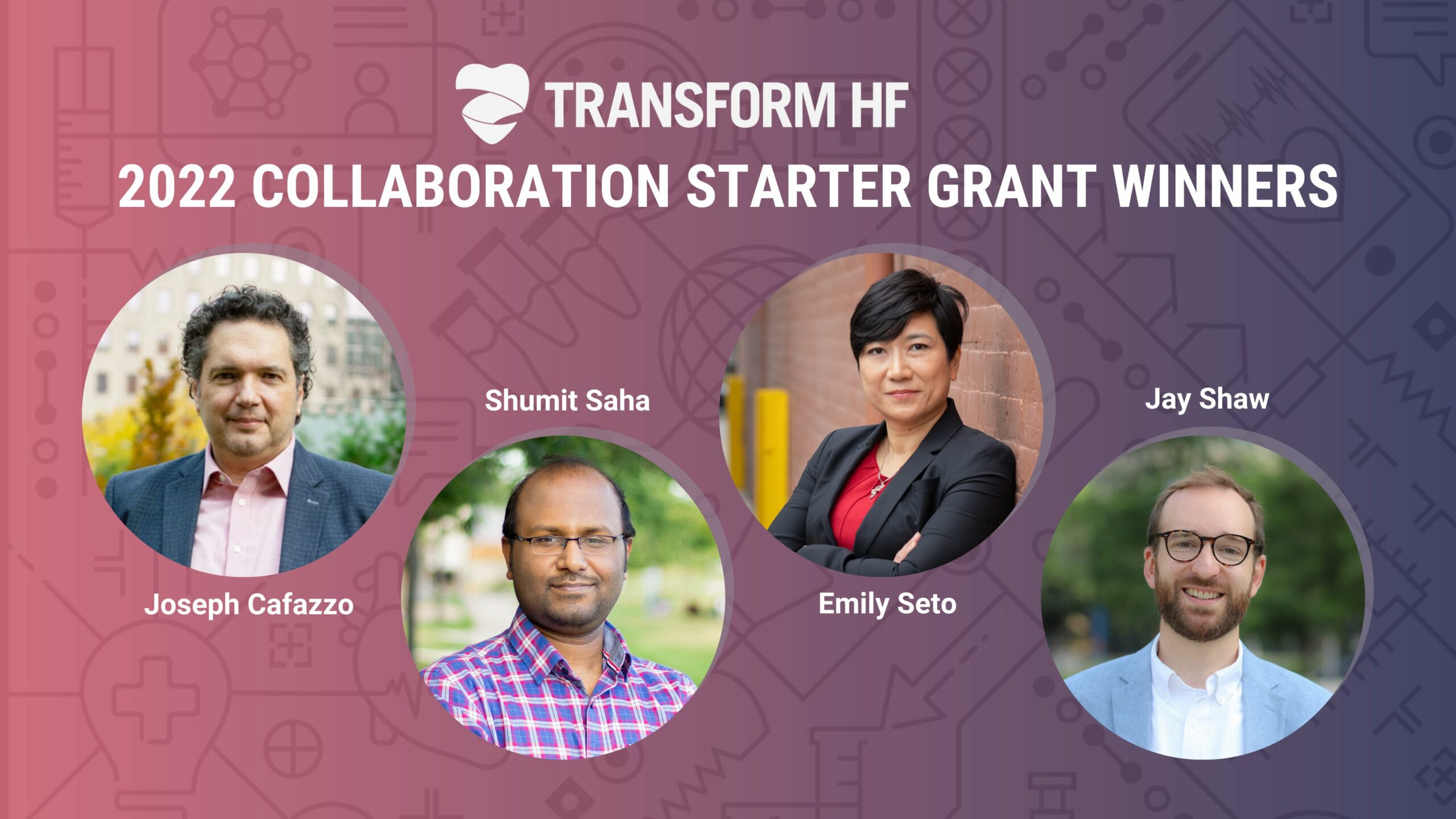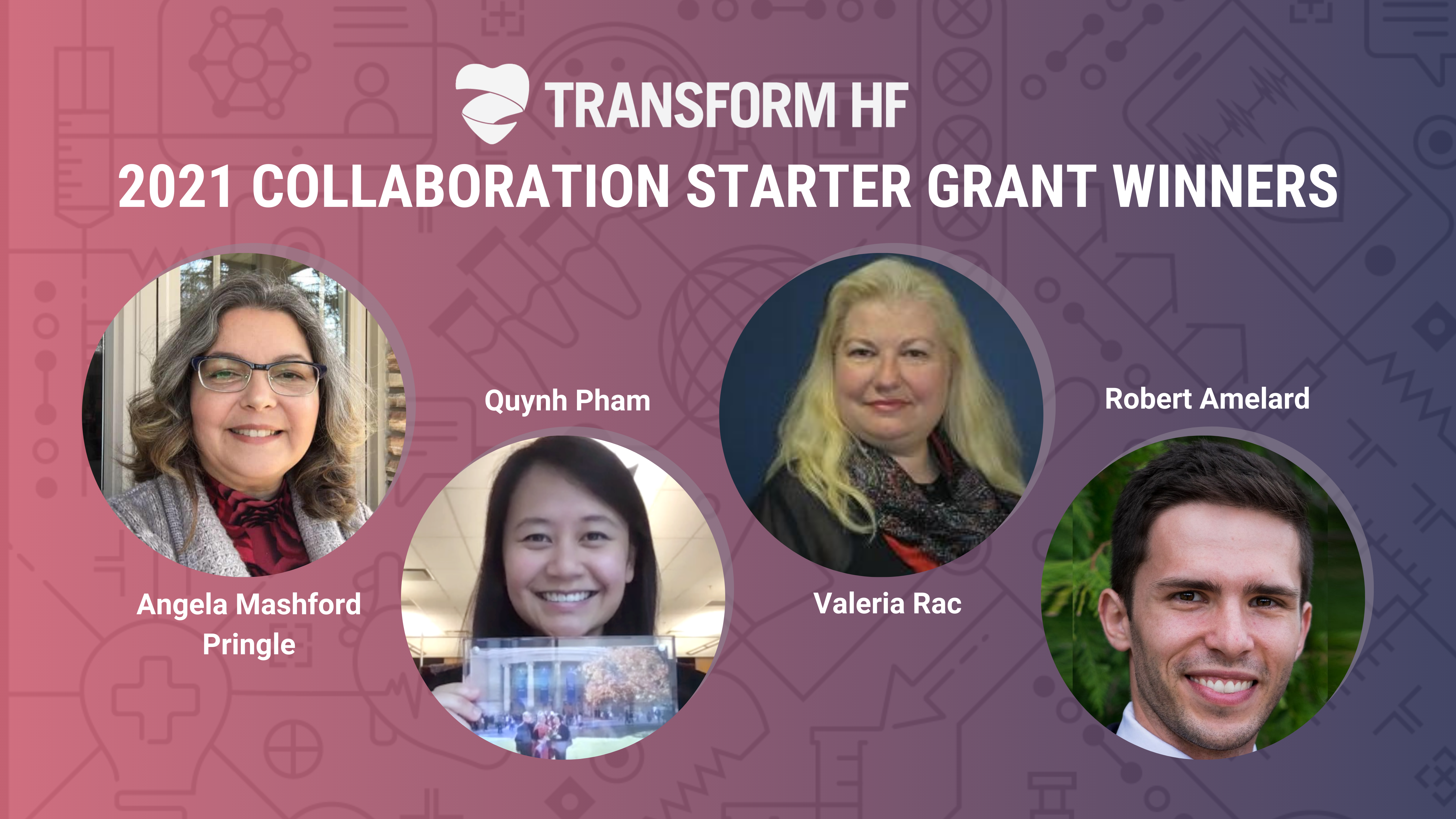Collaboration Starter Grants
Our Collaboration Starter Grants support members of our community working together by funding the initial activities of collaborative projects that align with the TRANSFORM HF mission. These activities can include preliminary project research and data collection, patient or Knowledge Keeper compensation, meeting facilitation, and proposal writing.
To apply for a Collaboration Starter Grant or learn when the next competition opens, visit our Opportunities page.
2025 Collaboration Starter Grants

An environmental scan of digital solutions to support at-home self-management and prevention of hospitalizations among marginalized communities living with heart failure in Northwestern Toronto
Nadine Akbar, Syed (Najaf) Nadeem, Monica DaSilva, Krystle Luu, Nighina Noori, Fiorella Bruno
Humber River Health is a community-based hospital serving the diverse Northwestern Toronto region. As an academic researcher affiliated with the University of Toronto and HRH, Dr. Nadine Akbar is looking to support at-home monitoring of the region’s heart failure patients to prevent future hospitalizations.
Together with her team, Dr. Akbar will use this Collaboration Starter Grant to work with Humber River Health’s brand-new Heart Failure Clinic in the identification of the most appropriate remote monitoring tool for the communities served by the hospital. This project will involve environmental scans, focus groups, and preparation for a pilot study of the selected tool – all under the guidance of an advisory group composed of people with lived experience, clinicians, and researchers.
Public Housing and Paediatric Cardiac Arrest Study
Bradley Hallett, Tim Chan, Sofie Kjærholm, Carolina Malta Hansen
This project seeks to investigate the disparities in the incidence, response, and outcomes of pediatric out-of-hospital cardiac arrest (OHCA) in public housing areas compared to other residential areas.
Using an interdisciplinary approach and leveraging international databases, Hallett and his team will gain a deeper understanding of local trends in cardiac arrest incidence, access to emergency medical services, and the role of community-driven response strategies in the context of the social determinants of health that influence outcomes in these communities. The findings of this project will inform best practices for improving pre-hospital care and bystander intervention rates in public housing areas.
Development of Smart Textile Solution for Monitoring Cardiovascular Health in this Era of Changing Climate
Saiful Hoque, Baptise Garnier, Azadeh Yadollahi, Vladan Koncar, Susan Marzolini, Sophia Yue Li, Marisol Campos-Navarette, Rene Adams
This Toronto-France collaboration seeks to develop ‘smart garments’ capable of monitoring heart function and controlling body temperature – a novel and important feature in the face of climate change.
Specifically, this project aims to gain a physiological understanding of how room temperature affects cardiovascular health and to develop smart garments (e.g. socks and chest band) to sense and change temperature, respectively to improve cardiovascular health outcomes in older adults with chronic conditions. With support from TRANSFORM HF, Dr. Hoque’s team will develop a garment prototype informed by community focus groups.
Advancing Heart Failure Research: A Collaborative Quantitative Meta-Analysis and Consultative Exercise
Kristina Kokorelias, Peter Hoang, Maurita Haris, Deal Valentine
Sinai Health Systems and Wilfrid Laurier University are coming together to explore the gap in heart failure care among older adults experiencing homelessness.
While it is known that older adults who experience homelessness have a higher frequency and earlier presentation of age-related comorbidities, the degree and severity of heart failure and coronary artery disease (CAD) has not been systematically reviewed in this population. Dr. Kokorelias’ team will conduct a systematic review to elucidate the prevalence and incidence of heart failure and CAD, and the risk compared to housed individuals. They will then engage with people with lived experience and experts to review their findings, develop a collaborative network, and develop a subsequent research proposal to continue advancing this work.
Harnessing Patient Feedback to Enhance Health System Planning and Advance Heart Failure Care
Zahra Shakeri, Dione Aleman, Emily Seto, AmirHosein Rostami
This project aims to advance the collection and analysis of patient experience data to support clinic and system-level improvements in heart failure care.
The team will conduct a scoping review on the use of patient experience data to improve heart failure care, perform an exploratory analysis of retrospective experience data from 45 Ontario hospitals using Natural Language Processing, and nurture collaborations for future initiatives aimed at leveraging patient experience data for healthcare improvement. Dr. Shakeri is hopeful that their work can help improve system approaches to service delivery and identify barriers to equitable and effective care.
Digitalization of Smoking Cessation Programs for Cardiovascular Patient Care – Designing A Mobile App Companion for Automated and Personalized Strategies to Achieve Sustainable Smoking Cessation
Panorama Health (Ruilin Wu, Kathryn Howe, Tenzin Yangzom, Sophie Sigfstead, Nathaniel Holwell) and Adim De
The Panorama Health team has joined forces with the Ottawa Model for Smoking Cessation (OMSC) team at the University of Ottawa Heart Institute to design an automated and personalized tool for smoking cessation!
Cigarette smoking is the second strongest risk factor for heart failure. While smoking cessation is beneficial for patients, support programs within our healthcare system remain generic, reactive, resource-intensive, and episodic. The Panorama Health team’s Sofee app aims to overcome these barriers by integrating with users’ wearable devices and automatically capturing smoking events. This grant will support the team in their new work with OMSC on user engagement and product development.
The feasibility of a cardiovascular point of care ultrasound education program combined with artificial Intelligence to improve the detection of heart failure in the Northern Ontario
Christopher Yu, Mali Worme, Yas Moayedi, Norissa Haynes, Katherine Turner, Amer Johri
Dr. Christopher Yu and his team are assessing the feasibility of deploying an AI-guided point-of-care ultrasound (POCUS) education program in the James and Hudson Bay Region.
Early and accurate detection of heart failure is critical to improving outcomes, yet barriers such as geographic isolation, a shortage of healthcare professionals, and limited diagnostic infrastructure can negatively impact outcomes for those living in remote areas, such as in the James and Hudson Bay Region. Dr. Yu and his team believe point-of-care cardiac ultrasound (POCUS), a diagnostic tool, can provide a potential solution. Working together with partners from Weeneebayko Area Health Authority, Yale University, and Queen’s University, the UHN-led team proposes to support regional capacity through hands-on training of the POCUS system, device provision, and collaborative diagnosis.
2024 Collaboration Starter Grants

Establishing Equitable Human Factors Design Methods to Improve Digital Therapeutics for Heart Failure Management
Dr. Quynh Pham, Dr. Enid Montague, Dr. Charlene Chu, Ruben Tjhie, Dr. Sarah Ritvo, and Soyun Oh
Dr. Pham and her team of interdisciplinary collaborators want to shift the paradigm in human factors design methodology. The group is building new Medly modules for mental health, drug titration, and caregiver support guided by human factors design methods to ensure a safe interaction between the user and technology; however, through this process, they’ve identified significant inclusion, equity, diversity, and access limitations in their human factors approaches.
Leveraging their unique disciplines and areas of expertise, this collaboration will work to advance equitable human factors design, with an overarching goal of addressing structural inequities in remote heart failure management.
AED Access in the Weeneebayko Area
Dr. Mali Worme, Dr. Timothy Chan, Dr. Andrew Ha, Dr. Katherine Turner, Dr. Mena Gewarges, and Ms. C Kapashesit
Automated External Defibrillators (AEDs) are vital for saving lives during cardiac arrest; however, despite their efficacy, the accessibility, maintenance, and utilization of AEDs in the Weeneebayko Area is currently unknown. Dr. Worme and team are conducting a comprehensive assessment to identify barriers to AED deployment, determine optimal locations for prospective AED placement, and develop culturally sensitive strategies to improve access to an AEDs during cardiac arrest in this region.
This project will have a significant focus on engagement with community leaders, elders, and residents to understand their perspectives and will also work in partnership with the AED Foundation of Ontario—a non-profit organization made up of paramedics—to help enhance community preparedness.
Identifying Equity Failures in Heart Failure Access, Treatment and Self Management for Black Canadians and Co-Designed Solutions
Dr. Enid Montague, Dr. Yas Moayedi, Dr. Husam Abdel-Qadir, Dr. Chris McIntosh, and Tselot Tessema
Dr. Montague and team are developing a research collaboration to identify the barriers and facilitators to heart failure treatment for Black patients in the Greater Toronto Area.
Using an intersectional lens and community-based approach, their collaboration will include UHN, the University of Toronto’s Department of Mechanical and Industrial Engineering, local community health centers, and the Black Health Alliance—a community-led registered charity working to improve the health and well-being of Black communities in Canada. Their goal is to develop equity centered solutions that address system failures and health disparities.
Designing Equitable Patient-Centered Smart Pillowcase for Better Sleep and Heart-Healthy Living
Dr. Camellia Zakaria, Dr. Ben Kim, and Dr. Renzo Calderon-Anyosa
Dr. Zakaria and team are developing a smart pillowcase equipped with Electroencephalogram (EEG), Electrooculography (EOG), Electrodermal Activity (EDA), pulse oximeter (SPO2), and motion sensors to measure different features characterizing sleep apnea. Their aim is to promote smart pillowcases as an equitable home monitoring tool for people living with heart failure and a convenient device add-on for inpatient ward use.
Currently in the prototyping phase, the team will engage in participatory design processes—including patient users with heart failure—to investigate usability, large scale deployment, and comfort for users.
2023 Collaboration Starter Grants

Understanding, assessing, and improving clinic efficiency through coordination and management using artificial intelligence: A mixed-methods study
Kim Crasta, Ellis Gao, Joseph Ferenbok, Anna Goldenberg, JUan Duero Posada
Long wait times and burnout result from healthcare resources not meeting allocation demands, with research revealing a positive correlation between resource allocation and quality of care delivered. Traditionally, interventions avoided resource-intensive bottom-up approaches, leaving a knowledge gap in how factors affect clinic efficiency and how artificial intelligence (AI) enables optimization. This project aims to bridge this knowledge-application gap using four objectives:
- Extrapolate variables affecting patients’ overall health care.
- Understand factors’ interactions and their contribution to patient care.
- Recognize the barriers that exist between variables and interactions.
- Develop AI/ML predictive and analysis tool for resource allocation.
In harnessing AI to optimize clinic workflow in an outpatient setting, the research’s novelty in Canada will generate knowledge on healthcare resource allocation problems, iteratively determine optimal clinic coordination pathways, and recommend strategies to facilitate clinic efficiencies, thus informing health delivery and policy.
From Clinical Pathways to Service Models: Towards a Person-centered Approach for Remote Patient Monitoring
Ibukun Abejirinde, Payal Agarwal, Jeanette Smith, Myrtede Alfred, Michele Strom, Quynh Pham
Monitoring programs often take a disease centered approach, tailored to a specific clinical pathway – this inadvertently shifts focus from the individual to the disease. Additionally, remote patient monitoring is not immune to the existing inequities in heart failure care along the axes of gender, socioeconomic status, and ethnicity/culture. In an era of increasing multimorbidity, an integrated approach to health and wellbeing for chronically ill patients is imperative.
Dr. Abejirinde’s team has already identified common features of remote patient monitoring programs under four domains: 1) Technology, 2) Integration, 3) Patient-centricity/Equity, and 4) Touch. The TRANSFORM HF Collaboration Starter Grant will help to further advance this research and ultimately support the design and implementation of patient-centered service models.
The outputs of this work will inform a CIHR catalyst grant application to create an equitable service model that factors individual, institutional, and resource needs and can be piloted in real world settings.
Assessment of Real-World Challenges in Pulse Oximeter Technology Access in the Global South
Megh Rathod, Dan Franklin, Heather Ross, Elizabeth Igaga, Sahr Wali
Pulse oximeters are recognized by the World Health Organization as essential tools that improve patient safety. However, the issue of increased oximeter inaccuracies in highly melanated skin has been flagged. With current studies only available from populations in North America and an inadequate supply of pulse oximeters in low-resource countries, it is impossible to know just how far-reaching this problem is.
The lack of appropriate medical devices to meet the needs of low-and middle-income countries has long been a global health concern. Technology that does exist in developing countries is often imported from outside nations and does not consider local factors. This may lead to a disproportionately high percentage of imported medical devices in low-resource settings becoming non-functional in contrast to only 1% in high-income countries. The true extent of biased pulse oximetry may be unknown due to lack of access, but this also provides a fruitful opportunity for the technology to be adjusted to the realities of low-resource settings.
Valuable strategies can be realized in low-income countries by strengthening local capacity, supporting innovation, and encouraging inclusion. Megh Rathod plans to carry out this work via environmental scans, co-creation with local communities, development of educational material, and knowledge dissemination.
Improving Accessibility: The Development of Voice Biomarkers for Non-Invasive Blood Glucose Monitoring
Shumit Saha, Joseph Cafazzo, Yan Fossat, Ian Connell, Jouhyun Jeon
Prolonged exposure to abnormal blood glucose levels can cause diabetes mellitus, a leading cause of global mortality. In patients with heart failure, the prevalence of diabetes mellitus can reach up to 31%, highlighting the importance of controlling blood glucose levels to manage heart failure.
As blood glucose levels directly influence the neurologic, vascular, and muscular systems – all of which are essential components of voice function – Dr. Saha believes that changes in the level of blood glucose may influence aspects of voice. Building on primary evidence gathered by their partners at Kick Inc., Dr. Saha and his team plan to launch a pilot study to better understand the relationship between voice features and glucose levels.
Through this research, Dr. Saha will lead a new line of development for an improved, accessible blood glucose monitoring method.
Building a Medly Care Pathway to Support the Transition from Pediatric to Adult Care
Sahr Wali, Aamir Jeewa, Joseph Cafazzo, Navreet Gill, Stella Kozuszko
Advancements in care have seen more than 85% of children born with heart failure surviving into adulthood. However, care continuity has become a growing challenge with improvements in life expectancy, with many adolescent patients experiencing lapses of care during the transition to adult services. Prolonged gaps of care are especially common amongst ethnic minorities and patients of lower socioeconomic status due to systemic inequities.
Dr. Wali’s project aims to optimize the pediatric care journey by developing an integrative transition pathway between the Hospital for Sick Children and Toronto General Hospital. By leveraging the Medly-Peds and Medly digital therapeutic programs, her team will streamline the transfer of care and safeguard the patient care experience. Dr. Wali plans to use user-centered design principles and amplify patient voices to co-develop Medly “Bridge” – a module that enables the creation of individualized transition plans alongside their Medly care journey.
2022 Collaboration Starter Grants

Speech Production Analysis to Estimate Heart Failure Decompensation
Joe Cafazzo, Professor, Institute of Health Policy, Management and Evaluation; Executive Director, Biomedical Engineering, UHN
Decompensated heart failure is associated with fluid retention, which can result in altered voice features. This pilot study will investigate the effect of decompensated heart failure on speech production through the Medly app, integrating sex and gender considerations to account for the fundamental differences in male and female voices.
Through this research, the team will lead a new line of development for an easily accessible and reliable tool to predict and prevent heart failure decompensation.
Identifying Potential Barriers to Automatic Titration of Guideline Directed Medical Therapy for Patients with Heart Failure
Shumit Saha, Scientific Associate, Centre for Global eHealth Innovation
This project seeks to optimize an already developed rules-based auto-titration algorithm for Guideline Directed Medical Therapy (GDMT) through patient and clinician interviews. These interviews will help identify potential barriers to implementing the auto-titration model and shape the model’s user interface.
This will be the first study to explore the potential implementation process of automated titration of GDMT. Next steps include the inception of an automated heart failure therapy delivery model.
International Collaboration to Transform Heart Failure Care Models Facilitated by Virtual Care Technologies
Emily Seto, Associate Professor, Institute of Health Policy, Management and Evaluation; Affiliated Faculty, Techna Institute; Affiliated Researcher, Centre for Global eHealth Innovation
This project will support the creation of an international network of researchers, patients, clinicians, industry partners, and other stakeholders in Canada, the United Kingdom, and Australia for the development of a grant application. Aimed at advancing care models of heart failure (and other chronic diseases) that are facilitated by technologies, the application’s ultimate intent is to enable equitable and high-quality virtual care.
A Pan-Canadian Analysis of Policy Frameworks to Promote Health Equity in Virtual Care
Jay Shaw, Assistant Professor, Department of Physical Therapy; Research Director, Artificial Intelligence, Ethics & Health, Joint Centre for Bioethics; Scientist, Women’s College Hospital Institute for Health System Solutions and Virtual Care
Through interviews and workshops, this project will 1) investigate how strategies to promote engagement with virtual care technologies among structurally marginalized communities fit within existing Canadian policy frameworks and 2) seek to understand the perceived need among policy stakeholders for policies that enhance access to virtual care for structurally marginalized communities in Canada. The research team will prepare a tri-council grant submission as a final step of the project.
2021 Collaboration Starter Grants

Land-based learning approach to working with Indigenous peoples – a pilot project
Angela Mashford-Pringle, Assistant Professor and Associate Director, Waakebiness-Bryce Institute for Indigenous Health
Dr. Mashford-Pringle will guide TRANSFORM HF community members through a 3-day on-the-land program with teachings by Elders and Knowledge Keepers and guided by the land as a teacher. This learning journey aims to explore Indigenous research methods, colonization, terminology, socio-political context and current issues that Indigenous people face. With cultural safety at its core, the program will enable participants to self-reflect on their learning journey, moving to a strengths-based and trauma-informed lens as they engage with Indigenous communities and peoples.
Building a Medly Caretown to empower equitable heart failure shared care
Quynh Pham (Scientist at University Health Network and Associate Director of the Centre for Global eHealth Innovation), Noor El-Dassouki, Raima Lohani
Research will engage Medly knowledge users in co-creating enhancements to the remote monitoring application so that caregivers are better integrated and can help address gaps in access, especially for the elderly, those from ethnocultural minority communities, or those with limited English proficiency. The goal is to create a shared virtual care experience and define enhancements to build out new Medly Caretown features and functionality. (Medly is a remote patient management system designed to keep Canadians with heart failure safe at home.)
The Canadian Workshop to validate model for assessment of artificial intelligence
Valeria Rac (Scientist and Health Technology Assessment Lead, Ted Rogers Centre for Heart Research and Toronto General Hospital Research Institute), Aleksandra Stanimirovic
This project, with both TRANSFORM HF members and international collaborators, will create a Canadian framework to assess AI-powered technologies as such methods gain prominence and shape models and care solutions.
Understanding user acceptability requirements for remote heart failure monitoring in at-home environments
Robert Amelard, Postdoctoral Fellow, KITE-Toronto Rehabilitation Institute, University Health Network
A diverse group of TRANSFORM HF collaborators will conduct a series of user engagement studies with patient partners to optimize remote monitoring technology adherence, propose guidelines for technology design with patients, and build relationships for future funding competitions.
